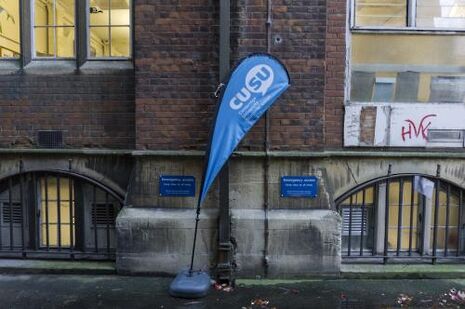Voting opens for last NUS delegate
Daniela Jacobson and Audrey Sebatindira are vying for the last place on the team that will attend the NUS Conference after Nailya Shamgunova dropped out

Voting opened on Monday to decide the final place on the Cambridge delegation that will attend the National Union of Students (NUS) National Conference this year.
The vote, which runs until the 2nd February, will decide which of three candidates will join the current team of four delegates who, along with Amatey Doku, the CUSU President, will represent the student body at the conference in late April. The candidates are Daniela Jacobson and Audrey Sebatindira, after Nailya Shamgunova withdrew from the race on Tuesday morning.
The NUS National Conference is an annual political conference during which policy for the coming year is decided. Delegates also elect a new leader for the union. Each year over 600 delegations attend.
Jacobson is a second year undergraduate studying French and Spanish at Emmanuel College. Her campaign will focus on three main issues: tackling discrimination and improving support for victims; making the NUS more accessible; and supporting volunteering initiatives. She thinks the NUS needs to "open up its democratic structure so that more students can take part in deciding on the future of their movement".
Sebatindira is currently the Women’s Officer on the CUSU sabbatical team and has attended the NUS conference in the past. Her manifesto focuses on the experience and knowledge of the NUS and Higher Education sector she has gained in these roles. In terms of policy, she wants to be involved in those policies concerned with "sexual harassment, decolonising curricula and making the NUS more transparent and representative". She would also meet with students regularly in order to source policy ideas.
Shamgunova, who has pulled out from the race, is a PhD student at Churchill College. She campaigned on her scepticism of the NUS, claiming, "I do not believe the NUS to be truly representative of the opinion of the majority of students in this country," and denouncing the "widespread antisemitism in the organisation". She cited her main priority was "to make what actually happens at the NUS known". Her policy focus would have been ensuring the NUS takes an "active role in protecting the interests of international students".
A spokesperson for the CUSU Elections Committee confirmed that Shamgunova withdrew at her own request, and not as a result of any ruling by the Committee.
Since her name cannot be withdrawn from the ballot, all votes for her will be allocated to the other candidates, in accordance with the preference system of voting used by CUSU.
The NUS conference this year is particularly significant. There have been a number of high-profile controversies, including accusations that the current NUS President, Malia Bouattia, had made anti-Semitic statements that lead to a wave of referendums in individual student unions to disaffiliate from the NUS. More recently, a video was leaked apparently showing NUS Vice-President Richard Brooks calling Bouattia a “racist” and discussing the internal opposition to her leadership.
The election this week is only open to candidates who identify as female or non-binary. This is due to the ‘Fair Representation on NUS Conference’ rule that was introduced in 2014. It states that at least half of any delegation must be self-defining women or non-binary. Currently there are already three self-identifying male delegates - Jonty Leibowitz, Josh Jackson and Amatey Doku (the president is automatically a delegate) - and only two self-identifying female candidates - Roberta Huldisch and Eireann Attridge.
This article has been updated to include the development of one candidate's withdrawal from the race.
 News / SU reluctantly registers controversial women’s soc18 December 2025
News / SU reluctantly registers controversial women’s soc18 December 2025 Features / Should I stay or should I go? Cambridge students and alumni reflect on how their memories stay with them15 December 2025
Features / Should I stay or should I go? Cambridge students and alumni reflect on how their memories stay with them15 December 2025 News / Dons warn PM about Vet School closure16 December 2025
News / Dons warn PM about Vet School closure16 December 2025 News / Cambridge study finds students learn better with notes than AI13 December 2025
News / Cambridge study finds students learn better with notes than AI13 December 2025 News / Uni registers controversial new women’s society28 November 2025
News / Uni registers controversial new women’s society28 November 2025









